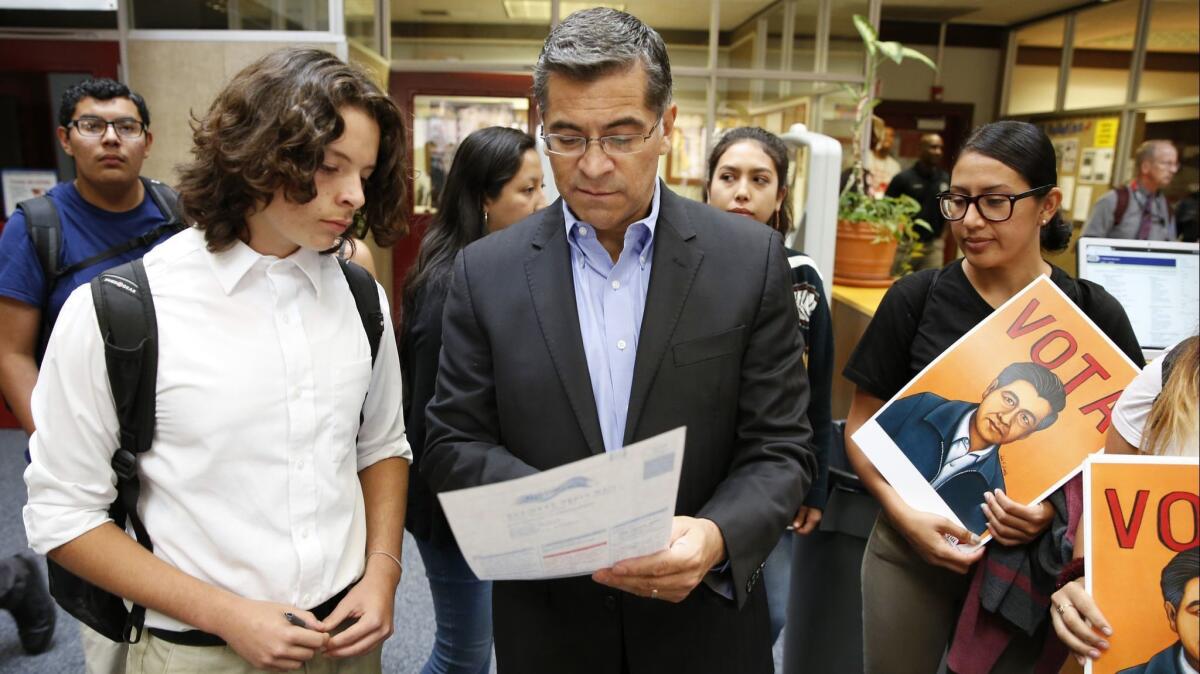Op-Ed: In the epic Trump vs. California battle, California is ahead

- Share via
For most of the past two years California has been widely regarded as the nation’s preeminent center of resistance to the Trump administration. “No other entity — ,” said one writer in the American Prospect early in 2017, “not the Democratic Party, not the tech industry, surely not the civil liberties lobby — has the will, the resources, and the power California brings to the fight.” That’s been the rough consensus ever since.
But what impact has that resistance — Atty. Gen. Xavier Becerra’s wave of lawsuits (45 at last count), California’s state and local sanctuary laws, the Air Resources Board’s pointed tightening of its already tough auto emissions regulations — had?
So far, California is winning.
California is the glaring alternative to the kind of society that Trump claims would Make America Great Again.
Becerra has a long list of victories:
* His suit (and a parallel University of California suit) secured two federal court orders blocking President Trump from ending the Deferred Action for Childhood Arrivals program launched in 2012. The Supreme Court this month declined to review those decisions until its next term. As a result, Becerra said in a press handout, “more than 276,000 Dreamers have been able to renew their deferred action and work authorization under DACA.”
* As the lead attorney general of a multi-state suit, he secured an appellate court order in December against administration rules denying access to birth control that was guaranteed by the Affordable Care Act.
* Becerra got the administration to drop attempts to overturn Environmental Protection Agency rules limiting production of high-polluting truck engines and regulations protecting agricultural workers and families. He also obtained a court order requiring EPA to ban the sale of the dangerous pesticide chlorpyrifos, and he forced the agency to provide documents bearing on EPA administrator Scott Pruitt’s alleged conflicts of interest. Pruitt later resigned.
* He successfully defended the “sanctuary state” act, SB54, against a federal suit to suspend it and to end public-safety funding for sanctuary cities.
These are real wins, landing blows against Trump’s agenda in Washington, but it’s far from clear how much effect they’ll have ultimately. The orders Becerra got from lower courts may still be overturned on appeal, particularly if they reach a Supreme Court that’s packed with conservatives.
But there’s more to the state’s clout than lawsuits.
In November, California — which hasn’t elected a Republican to statewide office since Arnold Schwarzenegger in 2006 — replaced seven of its 14 Republican House members with Democrats. The payoff for most of the state’s rejection of the Republican agenda — there are now more independents than Republicans registered in California — was on display last week. The new Democratic majority in the House coalesced under Speaker Nancy Pelosi’s tough, shrewd leadership, and in the stare-down over the budget and Trump’s demand for a wall, it was the president who blinked.
California’s most effective instrument of resistance, however, may be its reputation and character, its strength as a role model. It’s the un-Trump nation, an exemplary rebuke to presidential bluster and policies.
California has many problems — a severe housing shortage, a volatile tax structure too dependent on the wealthy and capital gains, unfunded pension liabilities, and growing gaps between the haves and have-nots. Nonetheless, it boasts the fifth or sixth largest economy in the world, and it has achieved its ongoing economic success despite three tax increases, and dire warnings that those increases and California’s stringent regulatory environment would drive business from the state.
The state has also thrived even as its population has grown ethnically more diverse. In 1994, with the passage of Proposition 187 — which denied all public services, including schooling, to immigrants in the country illegally — California looked a lot like the place Trump now wants America to be. But in the 25 years since, California repudiated the 1994 proposition. A federal judge overturned most of Proposition 187’s provisions, and ultimately, the state’s voters, and especially its Latino voters, were appalled by its naked nativism.
California now welcomes immigrants, and with its sanctuary laws, even undocumented immigrants. It makes them eligible not only for driver’s licenses and public education but for financial aid to its universities. It elects Latinos to high office. Its policies and politicians reflect the fact that for some 20 years, this has been a minority-majority state, and it will soon have a Latino majority. Californians seem to agree with the many economists who believe that immigration, writ large, lifts most boats.
Enter the Fray: First takes on the news of the minute »
The midterm elections represented a significant win for the Trump resistance, and California played a decisive part in that victory. The state’s defiance of Trump immigration and environmental policies, and its court challenges, at least shields the people within its borders in the short term and in some cases has bought time for vulnerable populations and ecosystems nationally. But it is the state’s economic success as it pursues progressive values, its inexorable demographics and its broader cultural influence in everything from food and music to clothes and architecture, that may be most telling in assessing the long-term success of its influence.
California is the glaring alternative to the kind of society that Trump claims would Make America Great Again. Other states, notably Texas, Arizona and Nevada, are on a similar trajectory as more Latinos and more women get politically engaged, and younger voters get on the rolls.
“If the United States wanted to see itself as a successful world commonwealth,” wrote California’s great historian Kevin Starr in 2004, “all it had to do was to look at California.” That’s beginning to sound ever more prophetic.
Peter Schrag, the former editorial page editor at the Sacramento Bee, is the author of “California Fights Back: The Golden State in the Age of Trump.”
Follow the Opinion section on Twitter @latimesopinionand Facebook
More to Read
A cure for the common opinion
Get thought-provoking perspectives with our weekly newsletter.
You may occasionally receive promotional content from the Los Angeles Times.










